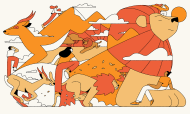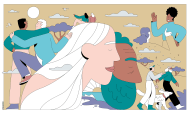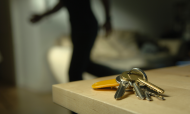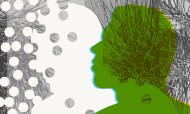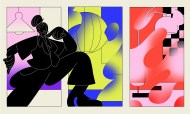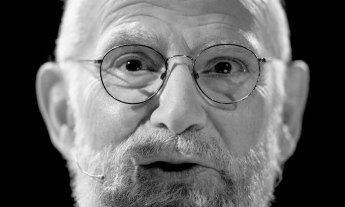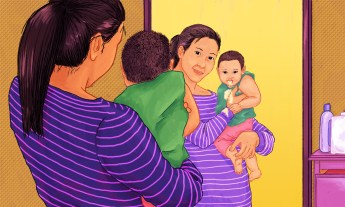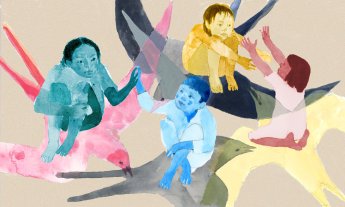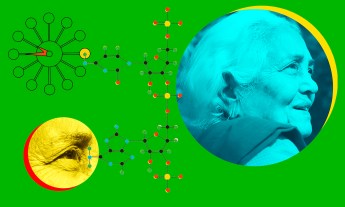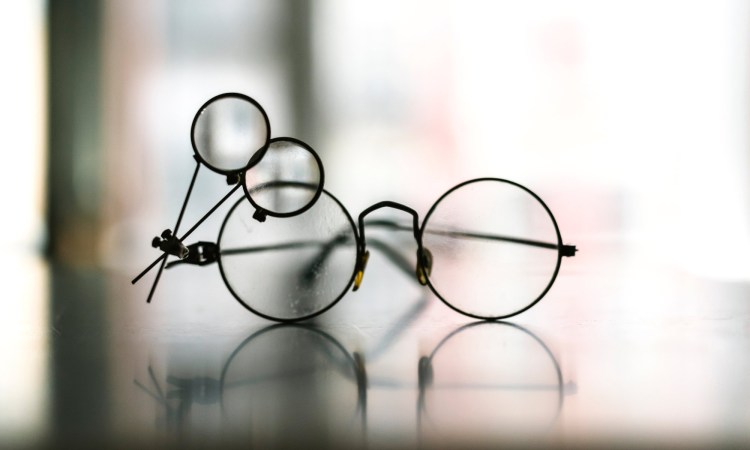
A memorable conversation with Oliver Sacks reveals what might have been his greatest attribute: undying curiosity.
I remember knocking at his door, nervously clutching an inscribed copy of my book The Philosophical Breakfast Club and a bag from a local chocolatier. I hoped I had chosen my gifts well. He had written to tell me how much he enjoyed reading the book — he had even put it on a list of “Five Science Biographies that Inspired Me” — and I remembered hearing somewhere that he adored dark chocolate. I was nervous: Would I bore him? Was I wrong about the chocolate?
Out popped Oliver Sacks, peering at me uncertainly. His prosopagnosia, or face blindness, made him unable to recognize me from my author photo. When I told him who I was, he engulfed me in a great big bear hug. Pulling back, he gestured to his faded T-shirt from the University of Rotterdam in the Netherlands. “I wore this in your honor,” he proudly announced, knowing that I was finishing up a book about science and art in the Dutch Golden Age.
The ice broken, we sat in his book-filled living room, drinking his favorite smoky blend of tea and nibbling chocolate. Our cups and dishes, decorated with a 19th-century botanical drawing of ferns — some of the world’s oldest plants — were set among stacks of paper, fountain pens, a jumble of fossils, and a large, ornate magnifying glass.
Oliver asked about my new book, Eye of the Beholder, which details how 17th-century artists and scientists, armed with newly invented optical instruments, changed the way we see the world. Reaching for the magnifying glass, he demonstrated how he used this convex lens to read. Ocular cancer had taken the vision from his right eye, and cataracts clouded his left.
One interesting thing I had discovered in my research for the book was the difficulties involved with learning to see with the new instruments. Telescopes and microscopes were hard to look through, and the early users, including Antoni van Leeuwenhoek, the first person to see microscopic life, struggled to make sense of the new worlds they saw with the instruments. Oliver himself had written about the difficulties faced by people who gained their sight after living without it for most or all of their lives. They too had to learn to see — in their case, a world that they had previously navigated by other senses, by touch and hearing.
I thought Oliver would be drawn to van Leeuwenhoek for another reason: the two men shared a relentless curiosity about the natural world. During the fifty years of his career as a microscopist, van Leeuwenhoek put everything he could get his hands on under his microscope: water from a nearby lake; the optic nerves of a cow; sperm from his own “lawful coitus” with his wife; vermin found in the grain stores of the Dutch East India Company; clay from chalk cliffs in England; bark, blood, skin, earwax, vomit, tooth plaque and other bodily effusions.
Even as he was dying of a disease of the diaphragm, van Leeuwenhoek dissected and examined a cow’s diaphragm and, on his deathbed, dictated a letter to the Royal Society about his findings.
Oliver clapped with glee when I pulled out of my purse a replica of van Leeuwenhoek’s tiny single-lens microscope. He held it close to his left eye, pointed upwards like a telescope, the way van Leeuwenhoek used it, and put a page of newsprint close to it.
“It works!” he exclaimed.
Van Leeuwenhoek may have been the first microbiologist, but he was not only a microbiologist. He was an insatiable investigator of all parts of the natural world — animal, vegetable and mineral. Oliver Sacks was also voraciously curious. His bookshelf labels exposed his wide-ranging interests: Minerals. Language. Lightning. Twins. Philosophy. Physics. Deafness. Genius. The Elements. Autism. Motorcycles. (To cite just a few.) His unending enthusiasm for all kinds of scientific inquiry led him to admire the works of the scientists of earlier times, like van Leeuwenhoek, John Herschel, Charles Babbage and William Whewell.
In their day, these men were called “natural philosophers.” The word “scientist” was not invented until 1833, when Whewell proposed it in response to a challenge by the poet Samuel Taylor Coleridge. The natural philosophers of the 19th century did not feel pigeonholed into one discipline or subject; their works ranged from geology to biology to chemistry as well as poetry, art and philosophy. But by helping to invent the modern, professional “scientist,” these men also helped create the specialization and narrow disciplinary boundaries that exist today, sometimes to the detriment of scientific curiosity.
One of Oliver’s greatest heroes, Charles Darwin, studied not only the flora and fauna he encountered on his Beagle voyage, but also pigeon breeding, geology, embryology, comparative anatomy and a wide range of organisms: barnacles, orchids, beetles and more. This kind of sweeping curiosity, the type that leads a scientist from one topic to another, with no regard for disciplinary boundaries, allowed Darwin to discover — and provide reams of evidence for — his theory of evolution by natural selection.
After nearly two hours of spirited, wide-ranging conversation that moved from science to history to philosophy to art, I realized that Oliver was beginning to tire. I stood to say goodbye. After another embrace, a kiss from him on both cheeks and a promise to meet again, I departed.
I never saw Oliver again. A few months later, he announced to the world that his ocular cancer had returned and metastasized to his liver. Eight months after that, he died.
Friends, colleagues and admirers of Oliver come together in New York next month, when the World Science Festival’s opening night will be a tribute to his life and work. We will also be celebrating his spirit of curiosity, his enthusiastic interest in anything animal, vegetable and mineral. His example is an inspiration to scientists, a reminder that they should look up from their disciplinary microscopes to see more than just what is right before their eyes.


